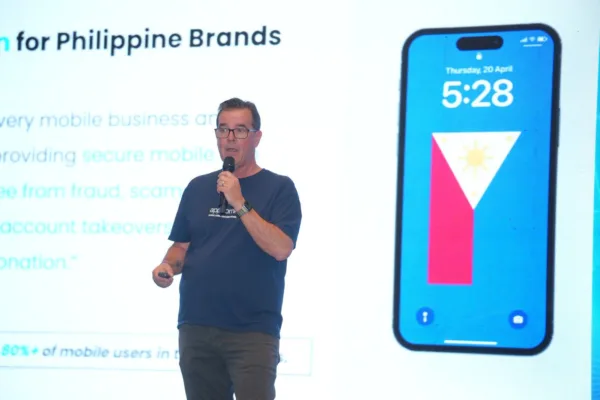As digital banking and mobile payments continue to surge across the Philippines, mobile fraud has emerged as one of the fastest-growing threats facing the fintech industry.
Appdome, a leading cybersecurity automation platform, is urging Philippine fintechs to move beyond static defenses and embrace adaptive identity protection to combat increasingly sophisticated, AI-driven fraud attacks.

In an exclusive interview with FintechNewsPH, Jan Sysmans, Mobile App Defense Evangelist at Appdome, warned that fraudsters are now evolving faster than traditional security systems can keep up — and that fintech players in emerging markets like the Philippines must act quickly to stay ahead.
A surge in mobile fraud threats
Over the past few years, mobile transactions in the Philippines have skyrocketed. According to the Bangko Sentral ng Pilipinas (BSP), more than 70% of Filipino adults are now financially included — largely through mobile-first banking and e-wallet platforms.
But with that convenience comes escalating risk.
“AI is making it so much easier for criminal organizations to scale and diversify attack vectors,” Sysmans said. “We’re even seeing the re-emergence of older banking Trojans that, with AI, have become more sophisticated and are once again targeting consumers in the Philippines.”
These modern attacks go beyond phishing or credential-stuffing, he added. Fraudsters now use AI to replicate human behavior, bypass biometrics, and manipulate authentication systems.

Jan Sysmans, Mobile App Defense Evangelist at Appdome
“What you thought was good enough last year is no longer good enough today,” Sysmans emphasized. “Attackers are continuously improving their methods — and AI makes that a lot easier.”
He cited a global client whose “liveness check” authentication feature — designed to confirm a user’s 3D facial presence — was completely bypassed by AI. Appdome’s team built a defense in less than two weeks, underscoring how quickly fintechs must adapt to stay protected in this new threat landscape.
Adaptive identity protection: Building defense from within

To counter these evolving risks, Sysmans advocates for “adaptive identity protection” — a system that dynamically verifies user behavior, device integrity, and authentication signals in real time.
“Adaptive identity protection reduces false positives and customer friction by applying countermeasures only when runtime signals indicate a risk,” he explained.
Appdome’s platform detects and blocks fraudulent activity inside the app, not after a breach has occurred. Its ID Anchor technology uses AI to monitor signal integrity and maintain trust between the app, its APIs, and the user’s identity.
What’s more, it can flag malicious devices, block reused or factory-reset phones commonly found in “device farms,” and alert users through an “Is This You?” prompt when unauthorized access is detected.
“You can use AI to fight AI,” Sysmans said. “We help mobile businesses use AI to build, monitor, and respond to new threats in real time. This proactive approach, he noted, allows fintechs to create frictionless yet secure experiences — protecting users without bombarding them with repeated OTPs or CAPTCHA challenges.
Philippine fintechs: Balancing growth and security
The Philippines has become one of Southeast Asia’s fastest-growing fintech markets, driven by mobile-first consumers, government digitalization efforts, and the rise of new digital banks. Yet Sysmans cautioned that rapid growth often outpaces security readiness.
“When fintechs scale quickly, they tend to prioritize user acquisition and app performance,” he said. “Security often comes later — sometimes only after an incident. But by then, the reputational damage is already done.”
Appdome’s no-code platform enables developers to embed advanced mobile defenses — including anti-tampering, anti-malware, and runtime protection — directly into Android or iOS apps. This setup aligns with the needs of fast-moving startups and neobanks that require both agility and compliance.
AI: The next big challenge for fintech fraud prevention

Sysmans revealed that Appdome’s threat intelligence system, ThreatScope, has observed a dramatic shift in the nature of attacks.
“Roughly 75% to 80% of the attacks we now see are AI-driven,” he said. “They’re faster, more automated, and far more persistent. If your fraud system reacts too slowly, it’s already too late.”
Appdome’s philosophy, he added, is that security systems must continuously learn and evolve with every new attempt.
“Adaptive identity protection means your app doesn’t just detect — it evolves,” Sysmans emphasized.
Collaboration across the ecosystem
Sysmans also underscored that defending against mobile fraud requires collective action across the fintech ecosystem — from regulators and banks to developers and consumers.
He praised the BSP’s ongoing efforts to modernize digital payments and strengthen cybersecurity standards but said compliance alone isn’t sufficient.
“The BSP is doing an excellent job setting guidelines for open finance and secure payments,” he noted. “But fintechs must go beyond compliance — they need to make fraud prevention part of their product DNA.”
The future of fintech security in the Philippines
Sysmans believes that the future of fintech success in the Philippines will depend not just on innovation, but also on resilience.
“Filipinos are embracing digital finance faster than ever,” he said. “The fintechs that will thrive are those that protect their users as passionately as they serve them.”
As mobile-first innovation accelerates — alongside increasingly agile cybercriminals — Appdome’s call for adaptive identity protection serves as a timely reminder: growth and security must advance together, not one after the other.








